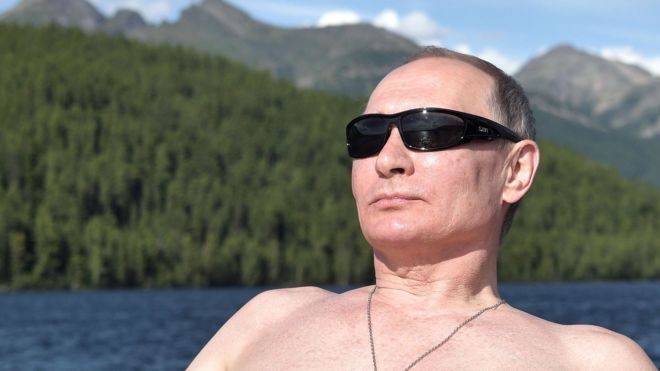A hashtag which translates as "Happy Birthday President" began trending in early that day in Russia.
The tag seemed to originate with this tweet:
While the tweet was shared more than 800 times, many of those sharing it did not appear to be Russian speakers. They also seemed to lack the personality of an individual, were often advertising services, and with account information containing frequent typos.
"We are a professional photo servic in Vicoria an on Vancouver Island" (sic) said one. Another described themselves as a "Maria Arts Mrketing Guru" (also sic).
Several also contained sexually explicit content.
Who is @vitischeg?
The @vitischeg profile also raises suspicions. The account was created in 2014 yet all tweets posted prior to 20 September appear to have been deleted. An analysis of the timeline suggests the account has stayed inactive for months at a time.
The bio states that the account holder is named Viktor Petrov-Vodkin - who shares his surname with a prominent Soviet painter. But an analysis by BBC Monitoring, using the social media tool Crimson Hexagon, shows the account previously used the name Viktor Vodkin-Petrov.
While the name Viktor, and the profile picture of a bearded man wearing shades, indicate that the owner of the account is masculine, a now-deleted tweet from 16 September uses the feminine form of a verb to describe how the account owner tried to make a salad.
This is not the first time @vitischeg has wished Vladimir Putin happy birthday. In 2016, the account tweeted the same meme of the bear but with the hashtag #PutinDay. That trending tag was reported on by two Kremlin-funded outlets, RT and Sputnik.
The surprising new strategy of pro-Russia bots
How pro-Russian trolls tried to destroy me
Tops off for #PutinShirtlessChallenge
Follow BBC Trending on Facebook
Random letters and numbers
On Putin's birthday this year, another account which shared the presidential well-wishing hashtag also raised suspicions.
This time, while almost all of the re-tweeters of the message by @YuryKuznetsov65 appeared to speak Russian, they still exhibited signs of being bots. Many of them had generic profile pictures of a logo, a landscape or a film character.
Similarly the names of many of these accounts are a random combination of numbers and letters (e.g. @NK598489, @8202ed2f4f1441a, @gda070874, or @V13155800). These are classic tell-tale signs of potential Twitter bots.
The @YuryKuznetsov65 account, was less than a day old at the time of tweeting. It claims, however, to be a replacement for @comradzampolit, a well-established pro-Kremlin account suspended by Twitter earlier this year.
source: BBC







No comments: